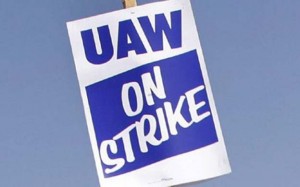The United Auto Workers has backed away from a potential strike at the Ford Motor Co. by approving an indefinite contract extension with the automaker.
The current UAW contract was scheduled to expire at 11:59 p.m. Wednesday and the union could have automatically called a strike. Union members approved a strike at Ford earlier this month.
“I can confirm that Ford and the UAW have agreed to continue bargaining past the expiration of the current contract in an effort to reach a tentative agreement that is in the best interest of both parties,” said Ford spokeswoman Marcey Evans.
“At this time,” she added, “we are not going to provide further comment about the nature of our discussions, or speculate about timing or the potential outcome of our talks,” Evans.
Meanwhile, the UAW continues to negotiate with General Motors and Chrysler in anticipation of reaching a final agreement.
The UAW began separate talks with all three automakers in late July to replace its existing 4-year contracts. The negotiations have proceeded in a markedly different pattern from years past due to a variety of unusual circumstances.
For one thing, both labor and management accepted that there would neither be a strike nor corporate lock-out as a part of the federal bailout that saved both GM and Chrysler in 2009. The UAW can call for a strike at Ford, however, but union leaders have indicated they are well aware of the competitive disadvantages that would cause the maker – Ford generally considered to also have the best ongoing relations with the UAW.
Meanwhile, union President Bob King has acknowledged that the domestic makers, as a group, are struggling to maintain a newfound competitiveness with import rivals that can translate into increased jobs for the UAW’s membership.
Nonetheless, workers still hope to get some of their demands met. In particular, the UAW is pressing to increase wages for those hired in under a 2-tier job clause. They are currently receiving about half the pay and benefits of veteran UAW members.
The UAW’s negotiations with Ford, while ongoing, have lacked intensity for the last several days that would normally suggest the bargaining is moving towards a climax.
In addition, Lewis Booth, Ford’s chief financial officer told a conference for investors in London this past weekend he anticipated the company’s negotiations with the UAW to extend past the deadline.
“We expect to continue to work and to continue the discussions,” Booth said.
Harley Shaiken, a labor expert from the University of California-Berkley, said he expects the UAW to emerge with a settlement probably at GM at or just after the deadline Wednesday.
“I don’t think you gain anything by extending the talks,” he said.
The decision to continue talks with Ford are not unusual, however. In more normal times the UAW traditionally picks a so-called strike target weeks before the deadline then hammers out an agreement with that maker – usually chosen because it appears willing to provide the most lucrative contract.
Then negotiators take the agreement to the other manufacturers in a bid to get a pattern settlement across the industry.

